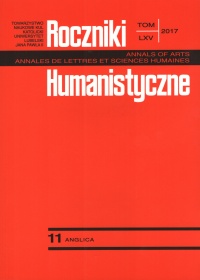Artistic Experiment as a Cognitive Strategy of the Contemporary Novel: A Case Study of Onde estas? by Sebastian Bukaczewski
Abstract
There are many ways in which the term experiment may be used with reference to art and, in particular, the novel. Most commonly the term is used for innovative techniques employed in artefacts. But artistic experiment may also consist in (1) the reader using artefacts to evoke her aesthetic response and enhance thereby her introspective potential, (2) the author (and the reader) exploring in the mode of fiction how real people might behave in certain situations, (3) the reader testing upon herself a hypothesis inscribed in the novel’s design. In this paper, the theoretical considerations are illustrated with an in-depth study of Bukaczewski’s Onde estas? as well as a brief discussion of other contemporary novels.
References
Ajdukiewicz, Kazimierz. Pragmatic Logic. Translated by Olgierd Wojtasiewicz. D. Reidel, 1974.
Blackmore, Susan. Consciousness: An Introduction. Hodder Education, 2010.
Bukaczewski, Sebastian. Onde estas? Mimochodem, 2012.
Elgin, Catherine Z. “Understanding Art and Science.” Midwest Studies in Philosophy, vol. 16, 1991, pp. 196–208.
Franklin, Allan and Slobodan Perovic. “Experiment in Physics.” The Stanford Encyclopedia of Philosophy. Edited by Edward N. Zalta. Accessed 27 Oct. 2016.
Gombrich, E. H. Art and Illusion: A Study in the Psychology of Pictorial Representation. 1960. Princeton UP, 2000.
Hardy, Barbara. “Love and Sympathy in Virginia Woolf.” The Uses of Fiction: Essays on the Modern Novel in Honour of Arnold Kettle. Edited by Douglas William Jefferson and Graham Martin. Open UP, 1982, pp. 199–211.
Johnson, B. S. Albert Angelo. 1964. Picador, 2004.
Kenyon, Olga. Women Novelists Today: A Survey of English Writing in the Seventies and Eighties. Harvester Press, 1988.
Lakoff George and Mark Johnson. Metaphors We Live By. The University of Chicago, 1980.
Martel, Yann. Life of Pi: A Novel. 2001. Canongate, 2003.
Moyes, Jojo. Me Before You. Penguin, 2012.
Nęcka, Edward, Jarosław Orzechowski and Błażej Szymura. Psychologia poznawcza. PWN, 2008.
Schneider, Daniel J. “Techniques of Cognition in Modern Fiction.” The Journal of Aesthetics and Art Criticism, vol. 26, no. 3, 1968, pp. 317-28. JSTOR. Accessed 30 Nov. 2013.
Shusterman, Ronald. “Virtual Realities and Autotelic Art & Author(s).” SubStance Special Issue: Epistémocritique vol. 22, no. 71-72, 1993, pp. 113-25. JSTOR Accessed 30 Nov. 2013.
Stępień, Antoni B. Teoria poznania. Zarys kursu uniwersyteckiego. KUL, 1971.
Swirski, Peter. Of Literature and Knowledge: Explorations in Narrative Thought Experiments, Evolution and Game Theory. Routledge, 2007.
Teske, Joanna Klara. Contradictions in Art: The Case of Postmodern Fiction. KUL, 2016.
Teske, Joanna Klara. “Life of Pi by Yann Martel: The Use of Contradictions in an Experimental Novel on the Epistemological Status of Theistic Belief.” Roczniki Humanistyczne, vol. 5, no. 62, 2014, pp. 269-84.
Welsh, Irvine. Filth. Vintage, 1996.
Zunshine, Lisa. Why We Read Fiction: Theory of Mind and the Novel. The Ohio University, 2006.
Copyright (c) 2017 Roczniki Humanistyczne

This work is licensed under a Creative Commons Attribution-NonCommercial-NoDerivatives 4.0 International License.





